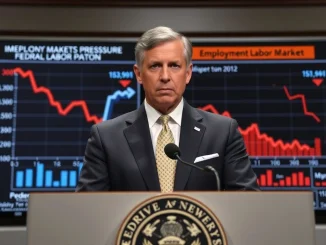
Buckle up, crypto enthusiasts! The economic landscape is getting a bit turbulent, and it’s crucial to understand how these shifts could impact your digital assets. JPMorgan Chase, a financial giant, has just dropped a bombshell: they’re now estimating a chilling 60% probability of a US recession. Yes, you read that right – a more than half chance that the world’s largest economy could be heading for a downturn. For those invested in the volatile world of cryptocurrencies, this news isn’t just background noise; it’s a potential earthquake on the horizon.
Why is JPMorgan Raising the Alarm on Recession Risk?
JPMorgan’s revised forecast isn’t based on a whim. It stems from a confluence of economic indicators that are flashing warning signs. Let’s break down some key factors contributing to this heightened recession risk:
- Aggressive Interest Rate Hikes: The Federal Reserve has been on a mission to combat inflation by aggressively raising interest rates. While intended to cool down the economy, these hikes can also stifle growth and trigger a contraction. Higher borrowing costs can reduce business investment and consumer spending, key drivers of economic expansion.
- Stubborn Inflation: Despite the Fed’s efforts, inflation remains stubbornly high. Persistent inflation erodes purchasing power and can lead to decreased consumer demand. If inflation isn’t tamed effectively, it can force the Fed to become even more aggressive, increasing the likelihood of a recession.
- Geopolitical Uncertainty: Global events, like ongoing conflicts and supply chain disruptions, add another layer of complexity. These uncertainties can further fuel inflation and dampen economic sentiment, contributing to the overall economic recession outlook.
- Leading Economic Indicators: Various leading economic indicators, such as the yield curve inversion and declining consumer confidence, are historically reliable predictors of recessions. These indicators are currently painting a concerning picture.
JPMorgan’s analysts are carefully monitoring these signals, and their 60% probability reflects a serious concern that these factors could converge to push the US economy into a recession.
What Does a US Recession Mean for Cryptocurrency?
Now, let’s get to the burning question for crypto investors: How does a potential US recession impact the cryptocurrency market? The relationship is complex and multifaceted, but here are some key considerations:
Potential Benefits for Crypto During Economic Downturns?
Historically, traditional assets like stocks and bonds often suffer during recessions. Could crypto offer a safe haven in such times? Here’s a nuanced look:
- Store of Value Narrative: Some argue that Bitcoin, in particular, could act as a store of value during economic uncertainty. The argument goes that as fiat currencies potentially weaken or become less attractive due to economic instability, investors might flock to Bitcoin’s perceived scarcity and decentralized nature.
- Alternative Asset Class: Cryptocurrencies are often viewed as an alternative asset class, uncorrelated to traditional markets. In a recession, if traditional markets decline, investors might diversify into crypto, seeking returns outside of conventional investments.
- Decentralized Finance (DeFi) Growth: Recessions can expose vulnerabilities in traditional financial systems. This could potentially drive interest in Decentralized Finance (DeFi) as an alternative, offering users more control and potentially higher yields than traditional banking in a low-interest-rate environment that often follows a recession.
Challenges and Risks for Crypto in a Recessionary Environment
However, it’s not all sunshine and rainbows for crypto in a recession. There are significant challenges and risks to consider:
- Risk-Off Sentiment: During economic downturns, investors tend to become risk-averse. Cryptocurrencies, being a relatively high-risk asset class, could face significant sell-offs as investors reduce their exposure to volatile assets and seek safer havens like cash or government bonds.
- Liquidity Crunch: Recessions can lead to tighter credit conditions and a liquidity crunch in the overall market. This could impact the crypto market as well, potentially leading to reduced trading volumes and increased volatility.
- Correlation with Traditional Markets: In recent times, cryptocurrencies, especially Bitcoin and Ethereum, have shown an increasing correlation with traditional stock markets, particularly the tech-heavy Nasdaq. If stock markets tumble during a recession, crypto might follow suit, negating its potential as an uncorrelated asset.
- Regulatory Scrutiny: Economic crises often lead to increased regulatory scrutiny across all sectors, including crypto. Governments might tighten regulations in response to economic instability, which could negatively impact the crypto market.
JPMorgan’s Perspective and Market Reactions
It’s important to remember that JPMorgan’s 60% financial risk assessment is just one perspective, albeit from a major financial institution. Other economists and analysts may have different views. However, JPMorgan’s pronouncements carry weight and can influence market sentiment.
The immediate market reaction to such news is often volatility. We might see:
- Increased Volatility in Crypto Markets: News of a potential recession can trigger fear and uncertainty in the crypto market, leading to sharp price swings.
- Potential Dip in Crypto Prices: If investors anticipate a risk-off environment, they might preemptively sell off crypto holdings, leading to price declines.
- Flight to Safety (Potentially to Bitcoin, but also Cash): Some investors might move towards Bitcoin as a perceived safe haven within the crypto space, but many others may simply move to cash or other more traditional safe-haven assets.
Navigating the Uncertainty: Actionable Insights for Crypto Investors
So, what should crypto investors do in light of this increased recession risk? Here are some actionable insights:
- Diversify Your Portfolio: Don’t put all your eggs in one basket. Diversify your investments across different asset classes, including but not limited to crypto. This can help mitigate risk during economic downturns.
- Risk Management is Key: Understand your risk tolerance and adjust your crypto portfolio accordingly. Consider reducing your exposure to highly volatile cryptocurrencies if you are risk-averse.
- Stay Informed: Keep a close watch on economic indicators, market news, and expert analysis. Being informed is crucial for making sound investment decisions.
- Dollar-Cost Averaging (DCA): Consider using dollar-cost averaging to invest in crypto over time. This strategy can help smooth out volatility and potentially reduce risk compared to lump-sum investments, especially in uncertain times.
- Long-Term Perspective: Remember that crypto is a long-term game. Recessions are a part of economic cycles. Focus on the long-term potential of the technology and projects you believe in, rather than getting caught up in short-term market fluctuations.
Conclusion: Brace for Potential Headwinds, But Stay Informed and Strategic
JPMorgan’s 60% US recession probability is a stark reminder that economic headwinds could be gathering. For cryptocurrency investors, this news warrants careful consideration. While crypto might offer some unique opportunities during a recession, it also faces significant challenges. The key is to stay informed, manage risk prudently, and maintain a long-term perspective. The crypto market is known for its resilience and innovation. By navigating these potentially turbulent times with knowledge and strategy, you can position yourself to weather the storm and potentially capitalize on future opportunities. Don’t panic, but prepare – the crypto journey ahead could be a bumpy ride, but also potentially a rewarding one for those who are ready.



